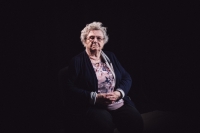During the war, I was witness of the transport of Jewish fellow citizens, interventions of Hlinka guards and the bombardment of Nitra
Mária Jurčová was born in 1934 in Nitra. She born to tailor‘s family and her father was of Hungarian nationality. During World War II, she was witness of mass transports of Jews, Hlinka guard interventions and the bombardment of Nitra. During the war, they hide three days of Viliam Širkoký in the chamber. She experienced the occupation in 1968. She graduated at three-year school of economics. She was a member of the presidency of the Women‘s Union, a member of the ONV, a member of the local council of the National Committee for the Slovak Women‘s Union in 1975 and chairwoman of the ROH. After 1990, she was a associate judge in court. She worked at Jednota for 15 years. She has two children and at nowdays is retired.
